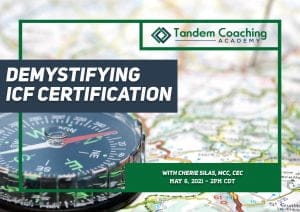Evoking awareness is a gift coaches can give their clients. Forward that awareness through its application and actions is what makes good coaching masterful.
Tandem Coaching Blog - Page 8
Professional Coaching
Asking powerful questions is more of a buzzword than a real skill agile and professional coaches use these days. In this video Alex Kudinov, PCC is digging into the source of the power behind questions a coach might ask and uncovers what is really going on.
We are hired to give our clients solutions that work, not to ask endless questions! I hear this emotional expression and its endless variations from a lot of agile coaches, including those at the top of the food chain of the agile world.
Fair enough, there’s a rhyme and reason to that view. And it is a deeply flawed one. Here is why.
So I heard this thing over the last couple of weeks from a few people, namely, some of our students are telling me is that, “Well, we heard that in coaching, we ask random questions, and that has a chance of bringing new awareness to clients.” And while I cannot argue with the latter, I […]
Hi, I’m Cherie Silas. I’m a Master Certified Coach and a Certified Enterprise coach. And the focus of my work is helping Scrum masters, agile coaches and organizational coaches to develop their coaching skills so that they can impact the clients in a stronger way. When I’m teaching professional coaching, one of the things that […]
Whether you are an experienced executive coach, or a starting life coach, or an aspiring career coach, there is a book that claims to be a fantastic resource to launch your careers to the next level.
Here are some excellent books that helped me in my professional and career development as a professional coach. Neither of these is an advanced coaching book that will teach you some sacral coaching knowledge and will propel you and your coaching career to the stardom. However, if you have time and patience to grab a concept here, and a tidbit there, you will be on your way to becoming and masterful coach and a successful person.
Cherie Silas leads a webinar where she explains the intricacies of the ICF Certification and demonstrates coaching skills and competencies in a coaching session.
Mastering ICF's Competency 5, Maintaining Presence, coaches craft a space for client self-discovery. Through deep listening and strategic silence, they foster an environment where clients feel heard, supported, and empowered to explore their own paths. This commitment to presence enhances every session, guiding clients toward profound insights and transformative growth.
The last few articles introduced concepts and International Coach Federation core competencies in co-creating the coach client relationship and building a strong coaching agreement with the client. In this article, we inspect another ICF core competency – Establishes and Maintains Agreements. We will also discuss the ways to make sure you and the client are appropriately matched before committing to a coaching relationship.
The last few articles introduced concepts and International Coach Federation core competencies in co-creating the coach client relationship and building a strong coaching agreement with the client. In this article, we inspect another ICF core competency – Establishes and Maintains Agreements. We will also discuss the ways to make sure you and the client are appropriately matched before committing to a coaching relationship.

Add team and organizational coaching skills to your toolset and boost your coaching business

Discover ICF PCC and ICF ACTC Team Coaching Competencies and Mastery
Are you eager to magnify the impact of your coaching practice?
Our ICF Team Competencies program offers a seamless transition for those who have mastered the core competencies, allowing you to delve deeper into the complexities and rewards of team coaching.
Explore this opportunity today.














